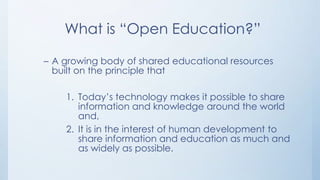Open educational resources (oer) power point
- 1. Open Educational Resources (OER) SBCTC OER 101 – Fall Cohort 1 Robin Ennis-Cantwell
- 2. What is “Open Education?” – A growing body of shared educational resources built on the principle that 1. Today’s technology makes it possible to share information and knowledge around the world and, 2. It is in the interest of human development to share information and education as much and as widely as possible.
- 3. What is an Open Education Resource (OER)? • The resource is shared under an open license or resides in the public domain
- 4. What are Open Educational Resources? • Shared content and resources – Full courses – Textbooks – Modules – Lessons/lesson plans – Tests – Videos – Supplemental study materials – Software
- 5. Advantages • Cost savings on Textbooks – Levels the field for disadvantaged students – Promotes sustainability • Resource Rich – Access to leading experts worldwide – Experience/incorporate diversity of views • Flexibility – Customize curriculum and instructional design – Quickly incorporate important updates (STEM)
- 6. Advantages (Cont.) • Universal Design for Learning (UDL) – Accommodate disabilities – Address learning styles – Foster engagement – Integrate current, relevant, authentic content
- 7. Disadvantages • Complications in Curriculum Development – Volume of material to evaluate/validate – Lack of funds/compensation – No responsibility to update original materials – No process to notify users of updates/changes to foundation materials • Attribution Issues – Lack of knowledge on open licensing process – Materials improperly cited – Inadvertent copyright violation
- 8. Disadvantages (cont.) • Slow/limited Conversion to OER Participation – Resistance to Change – Fear of loss of right-to-benefit – No mechanism to revoke permission – Discomfort with technology • Student Access to Technology – Disadvantaged student population – Digital down-and-out
- 9. Open Educational Resources Power Point by Robin EnnisCantwell is licensed under a Creative Commons AttributionNonCommercial-NoDerivs 3.0 Unported License.













